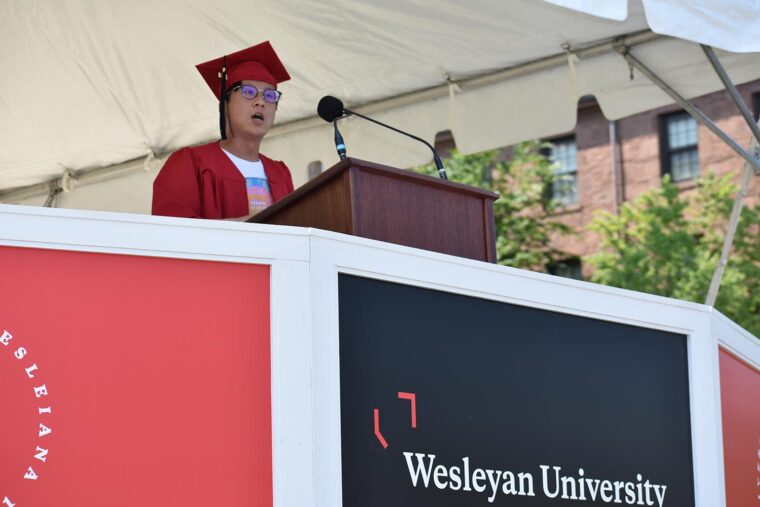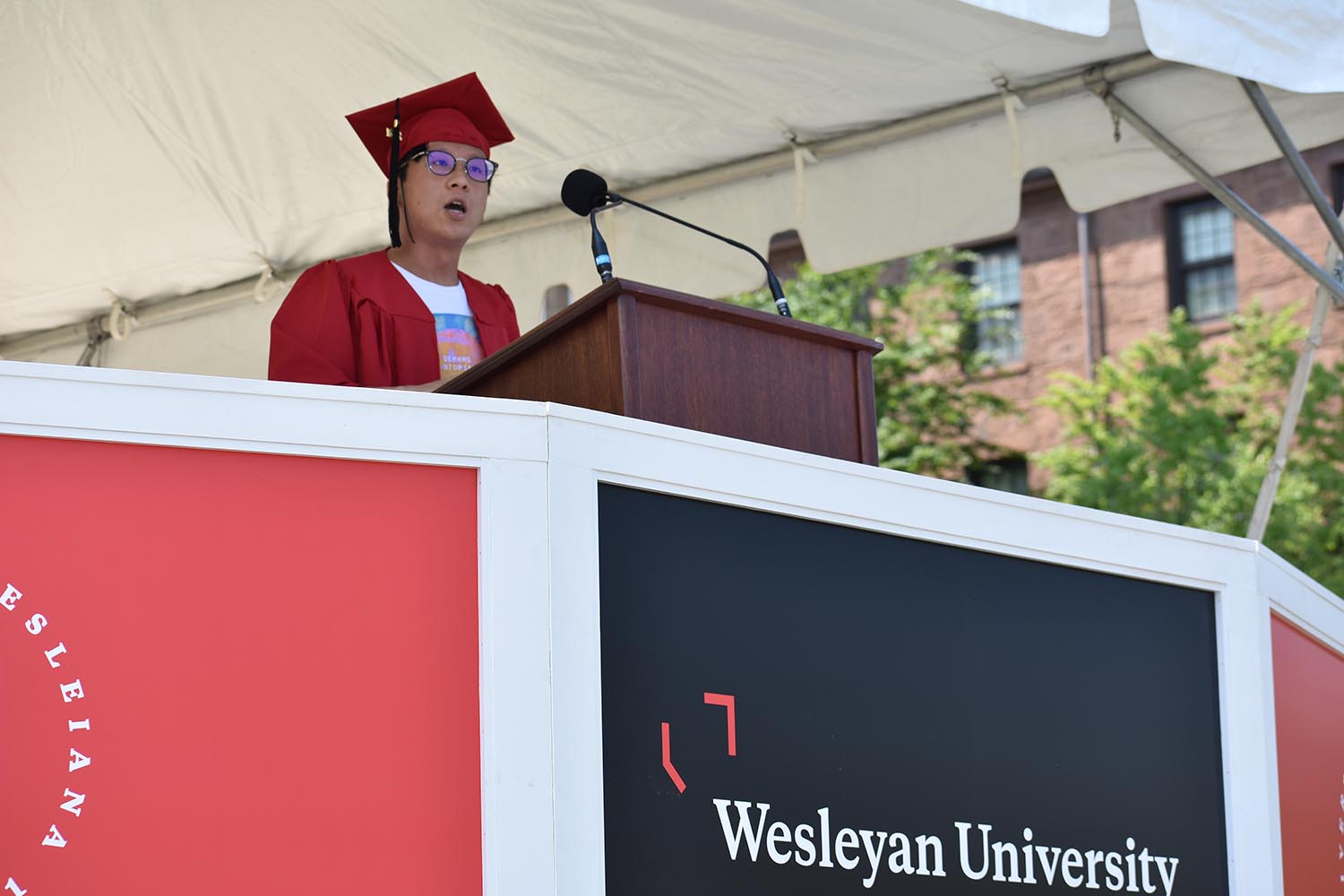Chong ’21 Talks Solidarity Amid Hardship in Senior Class Welcome: “Juxtaposition”


Bryan Chong ’21, a double major in government and psychology, delivered the Senior Class Welcome at Wesleyan’s 189th Commencement.
In a speech that was at moments emotional and rousing, Chong reflected on “an extraordinary year that has restructured the ways we socialize.” He emphasized the ways that this time of “generation-defining change” has challenged students to re-examine their time at Wesleyan and the juxtaposition of coming together in unexpected community despite being forced apart by the pandemic. “Many say that we discover our true selves during times of crisis,” he said. “This year, I discovered that amidst all the chaos and change, it is exactly from the abolition of division where Wesleyan’s true identity emerged as a site of solidarity.”
Chong was motivated to submit his speech for consideration to capture the communal experience of persevering through crisis and to “emphasize the beauty of our collective journey through this difficult year,” encouraging his peers to carry those lessons forward. “It is a great honor and joy for me to be able to highlight the special moments that showed how we endured crisis by standing strong together,” he said.
“We have had an extraordinary year full of difficulties and challenges at all levels, from the societal and systemic to the mundane and everyday, but it is precisely because of our collective struggle that we had beautiful moments of solidarity across difference and division—and it is up to us to continue building these bonds for the transformational change we need.”
Born and raised in Hong Kong, Chong has been an active member of the Wesleyan and greater Connecticut community, including work with the Wesleyan Democratic Socialists, Wesleyan North End Action Team, the Middletown Mutual Aid Collective, and Central Connecticut Democratic Socialists of America. During his senior year, Chong was elected to the Wesleyan Student Assembly, where he chaired the Civic Engagement Task Force and served as vice-chair of the Community Committee alongside extracurricular involvement with the varsity men’s golf team and Throw Culture, the mixed-gender Ultimate Frisbee team. He also currently serves as design director on the campaign of Alicia Hernandez Strong ’18 for mayor of New Britain. After graduation, Chong plans to stay in Connecticut for a while, learning more about the many grassroots and progressive organizing efforts that exist outside of Wesleyan.
The full text of his remarks (as prepared) is below:
Juxtaposition. I was once told that to sound sophisticated, just drop a funny-sounding, multi-syllable word that anyone can take to mean something profound. “Juxtaposition” in particular is a very Wesleyan-sounding word—it is exactly the kind of big word that liberal arts college students use. It’s even got an “x” in the middle of it! It’s easy to laugh at the long, bombastic circumlocutions that we will all try to escape after college, but as we end our college experience during generation-defining change, I have found that in confusion and desperation, all I can do is look back in its face and say, “juxtaposition.”
The aspects of pre-COVID life we grasped onto—returning to Wesleyan and spending our last year with our family away from family, at our home away from home—are juxtaposed with new ways of being and interacting thrust upon us to maintain a sense of “normalcy” in this new world.
As we eat and study and live with our friends, we talk to our classmates and professors behind the monitor. We watch our housemates scramble around to make lunch, trying not to get spotted in our Zoom background; and sometimes, we tell a well-timed joke to make them cover their face as they try to stop themselves from bursting into laughter on camera. And of course, there is nothing quite like waking up two minutes before class knowing that you can still make it on time.
Campus has been a lot quieter, even on perfectly good days—but the daily hustle and bustle of Usdan has not gone away. As we quickly adapted to bringing food home or eating outside, it is easy to forget that an entire class of frosh have yet to know there is a Loud Side and a Quiet Side. There is something strangely poetic about that. In an extraordinary year that has restructured the ways we socialize, this famed Wesleyan division just disappeared into the wind, and we were none the wiser.
And how many of us even remember the outrage about Wesleyan’s new logo, now emblazoned all across campus, including this podium right here? I’m sorry that I just reminded you of that—how much we disliked it. In case you forgot, we did succeed in changing it for the better! Either way, we all know that we are greater than the symbols that represent us.
To reflect on these moments, big and small—to reflect on the beauty of the mundane, is to realize the deeper ways Wesleyan has been transforming us—and how we have been transforming Wesleyan.
Many say that we discover our true selves during times of crisis. This year, I discovered that amidst all the chaos and change, it is exactly from the abolition of division where Wesleyan’s true identity emerged as a site of solidarity.
I still remember the moment last March, when we were told school would shut down—and panic started to set in. But I will never forget how only a mere two days after a few others and I launched the Wesleyan Mutual Aid Spreadsheet, that it was filled with rows and rows of offerings for food, transportation, shelter, and safety. Rows and rows of names juxtaposing students, alumni, faculty, and staff—but during that time, on that spreadsheet, we were simply all members of one community, aiding one another with no questions asked.
When we came back in the fall, we saw how the pandemic ravaged the lives of so many of our neighbors in Middletown—with whom we have been juxtaposed for so long, yet interacted with so little. But in crisis, the divisions of town and gown are being reimagined. Now there are spaces where Middletown residents and Wesleyan students act as equals and as one—not only serving community needs, but also radically re-envisioning what a greater sense of community could look like, transcending the borders of Washington, High, Church, and Vine. Only when I saw very different needs, very different community movements, and very different forms of injustice physically juxtaposed with my own, did I learn the true meaning of fighting for someone I don’t know.
As we speak of new normalcies, we must also acknowledge and pay respect to the dedication of campus workers—from dining staff, to custodians and Physical Plant workers, without whom we would not even have any normalcy to return to. Indeed, it has only been through their sacrifices that we had hygienic enough, healthy enough, and safe enough spaces to learn in.
It would be remiss to speak of solidarity and not acknowledge the particular moment of history we are in—the history of the movement for racial justice. From Louisville and Minneapolis to Gaza and the West Bank, students and young people everywhere are realizing the inextricable link between our fights against systems of oppression, and are committed to solidarity with each other in this new fight for justice. As an Asian, I saw students of all backgrounds come together to hold space for us in this time of fear. As an international student, I watched as American students petitioned the government when many of us were at risk of being deported last summer. As I am speaking right now, a Wesleyan alumna of color is running to become the first Black, Puerto Rican, and Muslim mayor of New Britain, a city just 20 minutes north of here. I can never fully understand the struggles that Black and brown people face—but as the world overwhelmed us through crisis after crisis, what I have seen is that we have stood shoulder-to-shoulder at times in literal juxtaposition. We stand together because now, we understand that we are not free, until we are all free.
The word “solidarity” is said so often now that its meaning is easily lost, but embedded so elegantly in a single word is a transformative idea: solid are the bonds forged through overcoming difference and division with empathy and trust. Indeed, it is only through the juxtaposition of our differences that solidarity is meaningful, that solidarity is possible.
Wesleyan has been to me a juxtaposition of all our differences, weaving tightly together a quilt of solidarity, beautiful in both its mosaic and particular. Each and every one of my experiences here have taught me to constantly marvel at the places I’ve been, the people I’ve met, and the collectives I’ve found, humbling as they are inspiring. Wesleyan’s beauty comes not merely from the sum of our voices, but from the multitude of experiences that make each of us invaluable to one another.
Although the light is at the end of the tunnel, we still have a ways to get there—and we understand now that for many others, there is still much darkness beyond that tunnel. But if what I’ve witnessed at Wesleyan is proof, if that sight of all of us on Foss just hours ago, stepping together out of the last darkness of the old world into the first light of a new one, embracing the promise of a new world, then I know that our solidarity will be a torch that illuminates the way forward—and we must carry on that torch for us, for all those coming after, and for many who need to find that light for themselves. I have no doubt in my mind that with this solidarity, we will build a brighter world together.
Thank you all very much. Solidarity forever!

